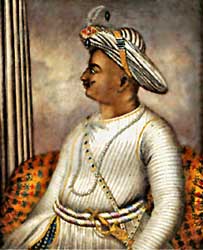Lord Wellesley
The circumstances which led to the Fourth Mysore War can be summarized as follows: Tipu Sultan wanted to avenge his humiliating defeat and the terms imposed on him by the British. He also aimed at making Mysore a strong state. Tipu worked continuously to secure help to fight British imperialism. He took efforts to seek the help of the France, Arabia, Kabul and Turkey. He corresponded with the Revolutionary French Government in July 1798. At Srirangapattinam, a Jacobian Club was started and the flag of the French Republic was hoisted. The tree of Liberty was also planted. Later, when Napoleon came to power, Tipu received a friendly letter from Napoleon (who was in Egypt at that time).
It was at this juncture that Wellesley reached Calcutta with a mind already filled with fear of Napoleon. Therefore, he prepared for a war against Mysore. As a part of his strategy, Wellesley tried to revive the Triple Alliance of 1790 with the Marathas.
 |
| Tipu Sultan |
Wellesley set out to persuade Tipu to accept a pact of subsidiary alliance and wrote letters requesting the Tipu to dismiss the French, to receive an English envoy, and to make terms with the Company and its allies. Tipu paid scant attention to Wellesley’s letters and thus the Fourth Anglo-Mysore war started.
The war was short and decisive. As planned, the Bombay army under General Stuart invaded Mysore from the west. The Madras army, which was led by the Governor-General’s brother, Arthur Wellesley, forced Tipu to retreat to his capital Srirangapattinam. Although severely wounded, he fought till his capital Srirangapattinam was captured and he himself was shot dead.
Information related to the search:
Lord Wellesley, tipu, wellesley, india, mysore, history, british, french, napoleon, alliance, srirangapattinam, lord, fourth, capital, subsidiary, army, marathas, letters, sultan, company, anglo, terms, started

